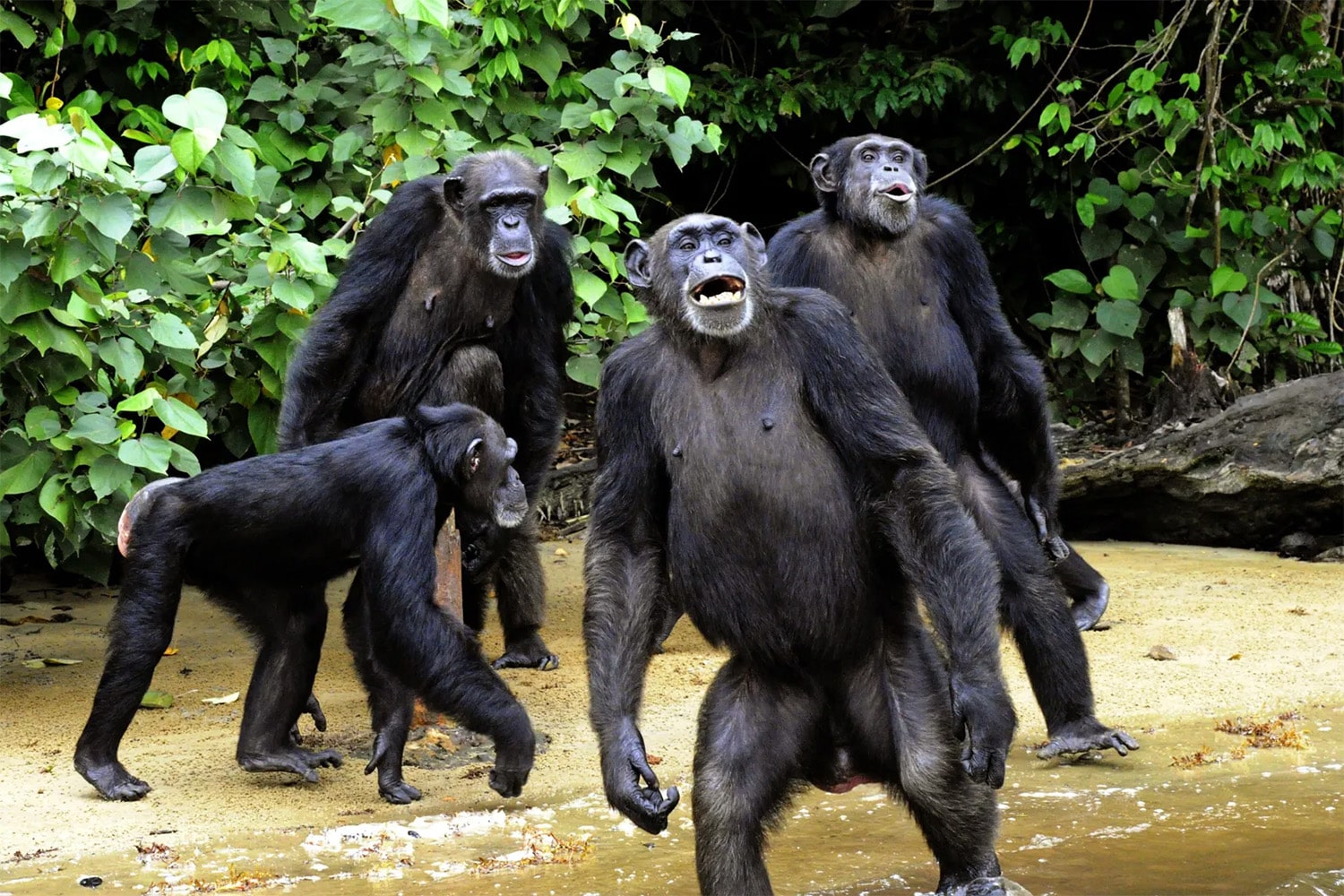
30 interesting facts about chimps
- 👁️ 263
Chimpanzees, our closest living relatives, share an astonishing 98% of their DNA with humans. Residing in the forests and savannahs of central and west Africa, these highly intelligent beings exhibit complex behaviors and social structures. A significant aspect of their fascinating world is their diet, which is incredibly diverse and showcases their adaptability and resourcefulness. Chimpanzees are known for their varied diet and the sophisticated ways they obtain food, from using tools to hunt or extract meals to selecting specific medicinal plants for health. Let’s explore some captivating facts about the dietary habits of chimpanzees that highlight their unique place in the animal kingdom.
- Chimpanzees are omnivores, enjoying a diet that includes fruits, leaves, nuts, seeds, honey, insects, and occasionally small animals.
- Fruit comprises more than half of the chimpanzee diet, making them primarily frugivorous.
- They use tools such as sticks, stones, and leaves to access food, demonstrating their problem-solving skills and intelligence.
- Termite fishing, where chimps use sticks to extract termites from mounds, is a well-documented example of their tool use.
- Chimpanzees have been observed modifying sticks to create more effective tools for hunting or extracting insects.
- Meat consumption, including small monkeys and bush pigs, accounts for a small but significant portion of their diet.
- Ants, bees, and their larvae are also eaten, with chimpanzees sometimes enduring bee stings to access honey.
- They engage in leaf sponging – using chewed leaves to soak up water or extract water from tree hollows.
- Chimpanzees partake in a practice known as “leaf swallowing,” consuming whole leaves to help expel intestinal parasites.
- The diet of a chimpanzee varies significantly with their habitat and the seasons, reflecting their flexibility and adaptability.
- Young chimpanzees learn what and how to eat by observing their mothers and other adults in the group.
- Chimpanzees are selective about the ripeness and type of fruit they eat, showing preferences for certain flavors and textures.
- They play an essential role in seed dispersal, aiding in the regeneration of their forest habitats.
- In some regions, chimpanzees consume soil, a behavior thought to supplement minerals or aid in digestion.
- They are known to participate in cooperative hunting, working together to capture larger prey.
- Chimpanzees have been observed fishing for algae with long sticks, demonstrating their ability to exploit aquatic food sources.
- The consumption of certain plant species with medicinal properties suggests chimpanzees self-medicate when ill.
- Social factors influence feeding behavior, with higher-ranking individuals often accessing the best food sources.
- Sharing food, especially meat, is a behavior that reinforces social bonds and hierarchies within chimpanzee communities.
- Chimpanzees have been observed cracking nuts with stones, a complex behavior requiring precision and forethought.
- They consume over 300 different plant species, reflecting their broad dietary palette and ecological knowledge.
- Water consumption methods are diverse, including drinking from rivers, using hollowed-out tree limbs, or creating water-absorbing tools.
- Insectivorous habits include consuming caterpillars, which are carefully inspected and cleaned before eating.
- Chimpanzees occasionally raid agricultural fields, eating crops such as maize, highlighting the impact of habitat encroachment.
- Food calls, specific vocalizations, are used to communicate the discovery of highly desirable foods like ripe fruit or honey.
- During periods of food scarcity, chimpanzees may travel great distances in search of nourishment.
- Some groups have unique dietary habits, suggesting cultural variations in food preferences and foraging techniques among chimpanzee populations.
- Figs are a crucial food source for chimpanzees due to their year-round availability in some habitats.
- Chimpanzees demonstrate patience and strategy in hunting, often ambushing or cornering prey.
- The division of labor during group hunts, with some chimps driving prey towards others, showcases their complex social cooperation.
The dietary habits of chimpanzees offer a window into their complex social lives, intelligence, and adaptability. Their ability to use tools, learn from one another, and engage in cooperative behaviors for hunting or food sharing underscores the depth of their cognitive abilities. Understanding what chimpanzees eat and how they obtain their food not only fascinates us but also provides valuable insights into the evolutionary roots of human behavior and the importance of conserving their natural habitats. As we continue to learn from these remarkable creatures, we are reminded of our shared connection and the need to protect the environments that sustain both chimpanzee and human life.
Chimpanzees, our closest living relatives, share an astonishing 98% of their DNA with humans. Residing in the forests and savannahs of central and west Africa, these highly intelligent beings exhibit complex behaviors and social structures. A significant aspect of their fascinating world is their diet, which is incredibly diverse and…